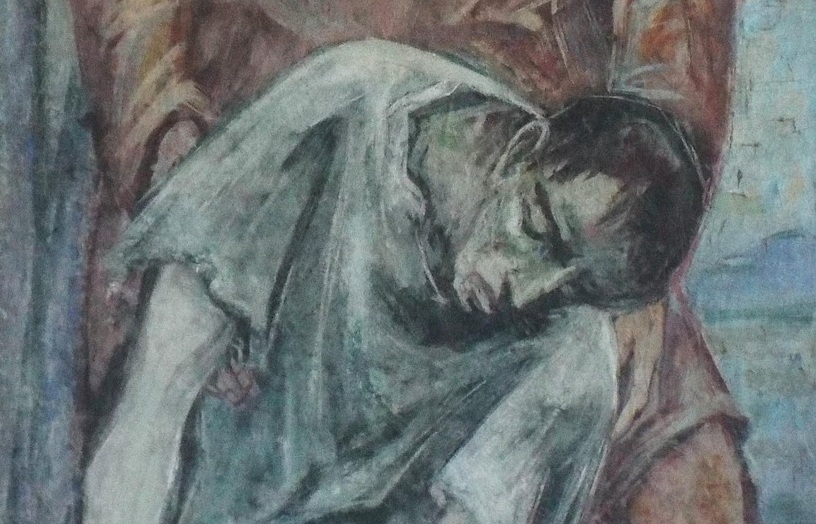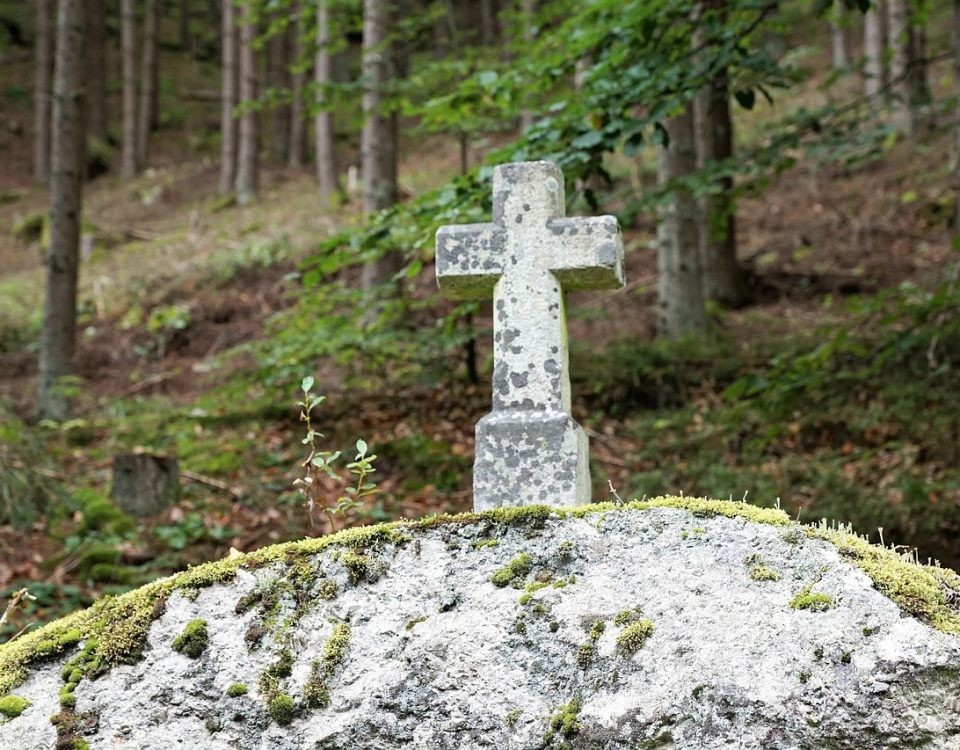Click here to listen to this homily.
Our great state of Texas is, of course, home to the best music in the nation—the best country music, even the best gospel and blues. I’ll honor no objections from any of our visitors from Mississippi, Alabama, or Tennessee. While preaching, I limit myself strictly to facts, you see, so you know I’m telling you the truth here, and it’s no use arguing about it.
Now one of my favorites is the bluesman Blind Willie Johnson, a haunting voice, a man who in his music preached a rather powerful Christ. Born down around Brenham, he lived most of his life in the little town of Marlin and later in Beaumont. In the late 1920s, however, he recorded a number of songs right here in Dallas—haunting as I said, songs which capture something of the wrath and mercy of God—the real God, before he is whittled down by sentimentality and comfort.[1]
One song of his has always stood out to me. It’s called “It’s Nobody’s Fault But Mine.” It’s a song about salvation and scripture, about family, spiritual purpose and spiritual failure. The song begins simply in a woeful voice, “Nobody’s fault but mine/ If I don’t read it my soul be lost.” The song goes on: “Father he taught me how to read…Mother she taught me how to read/ If I don’t read it my soul be lost, nobody’s fault but mine.” “I have a bible in my home…I have a bible of my own/ If I don’t read it my soul be lost.”[2] We don’t sing like that anymore, we comfortable Christians. We don’t preach like that anymore, we comfortable preachers. We don’t have the guts. We don’t have the spirit.
Now I bring this song to your attention not simply to share with you good music but also because of what we just heard—this rather odd and (on the surface at least) oddly placed parable. We have been following the Lord in recent weeks as he has argued and debated with scribes and Pharisees. It didn’t go well with them to put it simply. Arguments broke down, and at the end of it—not winning anybody over—Jesus just left. He said to his disciples, “You see this temple? Soon there’s not going to be a single stone standing.”[3] “[T]he gospel will be preached,” he said, “and then the end will come.”[4] Failing to persuade his listeners, Jesus began to talk about judgment—about something he called the “great tribulation,” about the darkening of the moon, the falling of the stars, the coming of the “Son of Man,” and the “grinding of teeth.”[5]
And then he tells this story about “talents.” Now, contrary to a lot of preaching on this particular parable, I do not think Jesus is talking about tithing or giving. I doubt very seriously that in middle of talking about tribulation and judgment, Jesus took a break just to talk about that—as if he was thinking, “I’d better be sure to give all those preachers down the line some good biblical fodder for all their capital campaigns.” No. That’s not what Jesus is talking about.
Rather, he’s talking about spiritual vigilance and spiritual effort. Jesus had just come from the temple—rejected. Soon he would be arrested and crucified. As John would say in summary: “He came to…his own, but his own people did not accept him.”[6] And so, as Jesus would say rather heartbreakingly, “the kingdom of God will be taken away from you,” given to another.[7] The Pharisees and scribes (and let’s be clear: not the Jewish people): they are those servants, given the “talents” of the Law and of the promises, who didn’t make good use of the gifts given them by God. Rather, they hoarded the legacy of the covenant, all to make for themselves a kingdom built upon human pride. The “wicked” servants are those who were given the good things of God (the Law, the prophets, the wisdom), but who kept it all for themselves, like it belonged to them by right. “You shut the kingdom of heaven in people’s faces,” he had said to them earlier.[8] They didn’t do anything with the good things they were given except make themselves spiritually blind, seeking their own glory instead of God’s glory.[9] That’s why they were cast into the outer darkness, to keep with the imagery of the parable. This has nothing to do with giving or tithing. It’s deeper than that. It’s about spiritual laziness; it’s about every excuse you’ve ever given God.
In the soul of each and every one of us (even in the silly and bitter atheist) there are “immortal longings,” to quote Shakespeare.[10] That is, we are given some sense, some yearning for the divine—each one of us. It belongs to our nature to wonder about what is infinitely beyond us. And some of us even have faith. We believe. Now what’s important is what you do with what you have.
Maybe you only half-believe; the other half of you doubts everything. Fine, that’s where you are. But what are doing about it? Heidegger said once that “questioning is the piety of thought.”[11] Are you wrestling with these bitterly eternal questions, or are you simply hooked like a fish by the demagogues of our fleeting and foolish world? Have you thought about your soul, your existence, this vivid thing we call life—I mean really thought about it? Or do you just laugh along or hate along with all the shallow sophisticates of the world: the Bill Mahers, the pundits, the celebrities, the influencers? Do you read a few headlines, watch an odd documentary some Tuesday night when nothing else is on—never really reading anything, never really praying, never really seeking that needful silence in which all truth is found?
And if you believe—if yours is an intellect illumined by the divine virtues—does your will lag behind? How many of us have committed to prayer—“This time I mean it!”—only for it to come to nothing? Work, family, work, overscheduling the life out of your kid, that dangerous amazing phone in your pocket: how many things do we let distract us from the prayer we know we need? How many of us with a heart for service, full of compassion, have only that—a heart, and nothing else, no good deeds to show for it? “I really would like to volunteer at the Austin Street Center…someday…maybe.” “I’d love to get to Mass, but we’ve got a tournament this weekend.” “Nobody’s fault but mine.” That’s what that old bluesman said, wasn’t it? “Nobody’s fault but mine.” What have you been given? What have you done with it? It’s not just the Pharisees that will be called to account; me and you will be too.
I imagine that at the judgment the hardest thing to hear will not be the indictment of all our crimes and misdemeanors and sins. We all know what our sins are, and so does God, and by the time you get to the end of it all, I reckon both God and you will simply be bored by it, tired even to hear about all your worn out pathetic sins. And in any case, God in his grace will forgive, simply out of love for us in our weakness. No, the litany of our past sins will not be what hurts on that latter day of judgment. Rather, it’s a question that will cause us the most pain when we stand in that finally honest place before God. It’s the question: “What were you waiting for?” That moment we realize we were free all along. We really weren’t too busy. We really weren’t too tired. “What were you waiting for?” Heaven is so close. God is so close. What are you waiting for? I preach to myself. I preach to you. Let’s listen to God together. Let’s give up our excuses together. Let’s find this kingdom Jesus talks about. It has drawn near. He said it.[12]
[1] Texas State Historical Association, http://www.tshaonline.org/handbook/online/articles/fjoaw
[2] Blind Willie Johnson, “It’s Nobody’s Fault But Mine” (1927)
[3] Matthew 24:2 paraphrase
[4] Matthew 24:14
[5] Matthew 24:21, 29, 44, 51
[6] John 1:12
[7] Matthew 21:43
[8] Matthew 23:13 (English Standard Version)
[9] John 5:44
[10] William Shakespeare, Anthony and Cleopatra V.ii
[11] Martin Heidegger: Basic Writings, 341
[12] Mark 1:15
© 2020 Rev. Joshua J. Whitfield










